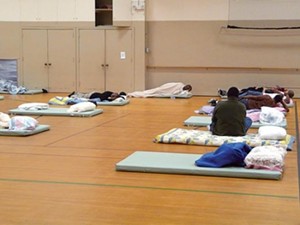Winston-Salem Homeless Left Sleeping in Chairs Due to Shelter Glitch

Six men took shelter under the eaves between two buildings at Bethesda Center for the Homeless in Winston-Salem at 7:45 p.m. last Wednesday.
Rain gusted through the gaps as they waited for a church van to transport them 12 blocks across town to a church basement where they could take shelter for the night.
Jan. 30 was the first night of operation for an alternative emergency overflow shelter opened at First Baptist Church on Fifth Street, but Bethesda Center was still handling check-in, making it a required first stop for guests.
AJ, a 27-year-old man dressed in a black jacket and black ball cap who declined to give his last name, said he had to turn to Bethesda Center for emergency shelter earlier this winter, and they allowed him to push two chairs together for an improvised bed in the day room. He said he wound up homeless after refusing a landlord’s orders to get rid of his pets. One cat went to the animal shelter; another cat, named Tiger, stays in a nearby park, where AJ feeds him.
Bethesda Center, a nonprofit agency that receives federal funding to provide emergency overflow shelter, has 99 beds available, 60 for men and 39 for women. Clients enrolled in the center’s 90-day program have first rights to the beds, and the remainder are available for those seeking emergency shelter on a first-come-first-served basis. Once the beds are full, Bethesda Center directs people to nearby Samaritan Ministries. As a last resort when all other beds are full, Executive Director Peggy Galloway confirmed that homeless people have been forced to sleep in chairs in the day room over the past two months.
“Having people in chairs — it was not the best option,” Galloway said, adding that she had hoped Bethesda Center would be prepared to provide cots to homeless people who show up seeking emergency shelter.
“It didn’t happen, and we feel sad about that,” she said.
From Dec. 1 through Jan. 29, including a spate of days in January when the temperature dipped down into the teens and twenties and an ice storm struck the Piedmont, a breakdown in communication between Bethesda Center and a host of community and church groups resulted in homeless people in Winston- Salem not having adequate emergency shelter. Bethesda Center provided overflow shelter services for 16 nights in December and 26 nights in January.
“What happened was we were supposed to be at First Baptist Church,” Galloway said. “First Baptist Church was under renovation. We did have them in chairs because we did not have a permit from the fire department and from the city to put mats down in our day room.”
Representatives of Anthony’s Plot, a Moravian social outreach organization that ministers to the poor in Winston- Salem, First Baptist Church, Bethesda Center and other agencies and churches that work with homeless people had been meeting as early as August to make plans for winter overflow emergency shelter. Representatives of the partnering organizations met again in early October under the auspices of the Winston-Salem/Forsyth Council on Services for the Homeless, commonly known as “the homeless council.”
Kyle Caudle, project coordinator at First Baptist, said the church did not complete repairs to a stairwell leading down to the basement gymnasium until the end of December.
“There were some communications lapses all around,” he said.
The Rev. Russ Post-May, who leads Anthony’s Plot, said he and others were initially under the impression that Bethesda Center was working to obtain a city permit for temporary overflow shelter, but was more or less equipped to handle the demand for shelter. Chris Murphy, acting inspections director for the Winston-Salem/Forsyth County Inspections Division, said Bethesda Center has yet to submit a plan to use its day room as a temporary overflow shelter. Galloway did not respond to inquiries about what, if any, efforts her agency made to bring the day room up to code for overflow services, or to communicate to city officials and partner organizations that help was needed to meet clients’ needs. Galloway acknowledged in a prepared statement released on Feb. 1 that her agency is “ineligible to provide the services in-house at the Bethesda Center” because of issues with building code.
“Anthony’s Plot owns the failures for the overflow shelter because we were part of the conversation back in August,” Post-May said. “We lost our place in the conversation.”
May added that everyone involved with the homeless council had been aware of challenges with Bethesda Center’s provision of emergency over flow shelter services in previous years. “That’s on us,” he said. “It’s on all the council.”
David W. Harold, chairman of the homeless council, said that while he been aware that homeless clients were forced to sleep in chairs at Bethesda Center “for a few nights last year,” he could not give a definite answer on when he became aware of it in the current cold-weather season.
“That is not the way we want things to work,” he said.
The homeless council oversees all homeless assistance programs funded by the US Department of Housing and Urban Development and is responsible for coordinating services and eliminating duplications. The council makes recommendations as to how federal funds should be spent, but the city gives final approval for the grants and contracts with nonprofits to provide services.
Ritchie Brooks, the city of Winston- Salem’s director of community and business development, said he had not been aware of the situation until late last week. Tim West, a program director with the city who is a member of the homeless council, said that he had been under the impression that homeless clients were being sent to other shelters or being given mats to sleep on until about Jan. 25, when he became aware of the challenges at Bethesda Center.
Bethesda Center has held responsibility for the emergency overflow shelter program since 2000. The city contracts with the nonprofit to provide $10,000 from a federal Emergency Solutions Grant for emergency overflow shelter.
The grant, paid out as a reimbursement for costs, includes funds for monitoring staff, maintenance and cleaning, utilities and transportation.
Galloway said she hired a shelter monitor for the overflow emergency shelter program, but that she has yet to request reimbursement. She added that the program has incurred about $1,600 in costs this winter. Galloway said the monitor receives about $8 per hour and works on an as-needed basis.
The contract specifies that “the program will provide adult males and females 18 and over with temporary shelter in a safe and clean environment during the year when the temperature is unbearable. It does not specify whether people seeking shelter will be provided a place to lie down or not. The contract, which was signed on Oct. 10, does state that clients would check in at Bethesda Center and be transported to First Baptist Church for shelter.
“I would think at the end of the day you would want everyone to have a place to lay their heads, but I believe the most important issue would be to have people out of the elements,” said Ritchie Brooks, the city’s community and business development director. “It’s very difficult to plan for all situations. You want everybody to be able to have a place to lay their heads, but that may not always be an option.”
Harold acknowledged that operation of overflow shelter services has not gone as planned.
“There was agreement back in October that we could use [First Baptist’s] space,” he said, “and that got put on hold there for a number of reasons. Kyle was out of town and they had the renovations. Bethesda had a change in their shelter manager. And all those contributed to the postponement.”
The city issued First Baptist Church a permit for a temporary overflow shelter for the homeless in January 2009, Murphy said. The special permit was created by the NC General Assembly in 2008 at the request of Winston-Salem homeless advocates. Ordinarily, building codes require the installation of a sprinkler system in any space that is being used for group shelter. The special permit provides an exemption as someone is designated each night to stay awake and alert occupants so they can evacuate should a fire break out. Considering that First Baptist Church already held the permit, Murphy said the church was able to obtain a renewal without undergoing another inspection. The church has provided emergency shelter in the past, but not in the two most recent years.
Rev. Post-May arrived at Bethesda Center to collect the six men in an Econoline church van at 6:54 p.m. on the night the overflow shelter at First Baptist Church opened last week.
“Guys, just so you know, this thing is open every day through February,” he said. “We need your patience. We’ve worked really hard to provide a bed to everyone. If you have another place — if someone offers you a place, you should take that. We can only provide shelter for people who have nowhere else to go.”
One of the men told May that he hadn’t had an opportunity to bathe in so long that his body odor was “offensive.” He asked May if he would have time to go back to Bethesda Center to take a shower. May replied that he wanted to establish some standards and asked for a moment to think about it. Finally, he suggested that the shower would be okay if the man could make it back to the shelter by 9 p.m. The man said he didn’t think that was realistic and that he would wait until the next day, expressing appreciation for May’s consideration.
The men unloaded from the van and filed into the gymnasium from a side entrance on Spruce Street. They waited in the stairwell as volunteers admitted them in twos and threes, pointing them to a plastic tub where they could stow their belongings and then assigning them mats on the floor.
With gusting wind, rain and a tornado advisory, about 30 people ended up bedding down in the gymnasium at final count. May said he was pleased at the turnout, considering that the largest number of people served by Bethesda Center for overflow beds so far this year was about 24. He added that two people showed up at First Baptist Church, but refused to check in because they didn’t want to go to Bethesda Center.
Several volunteers helped guests get situated, and four or five volunteers stayed overnight. Brandon Cain, the monitor hired by Bethesda Center, was at the shelter, along with a man identifying himself as a volunteer for the agency who took up a post in the stairwell with an electronic security wand.
Post-May said he would like to move check-in to First Baptist Church to streamline the process. But Galloway said she wants to keep check-in at Bethesda Center for a variety of reasons, including ensuring that only eligible adults are admitted and seizing weapons and other contraband that guests might be carrying.
At about 9:45 p.m. Post-May took a break, sitting behind the wheel of the van parked at Bethesda Center as rain drummed on the windshield. He let himself enjoy a sense of relief that the first night of operating the alternative overflow shelter was unfolding smoothly.
“A huge change just took place,” he said. “We just shifted from the shelter calling the shots to the people calling the shots.”




